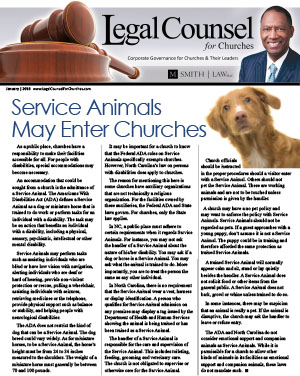As a public place, churches have a responsibility to make their facilities accessible for all. For people with disabilities, special accommodations may become necessary.
An accommodation that could be sought from a church is the admittance of a Service Animal. The Americans With Disabilities Act (ADA) defines a Service Animal as a dog or miniature horse that is trained to do work or perform tasks for an individual with a disability. The task may be an action that benefits an individual with a disability, including a physical, sensory, psychiatric, intellectual or other mental disability.
Service Animals may perform tasks such as assisting individuals who are blind or have low vision with navigation, alerting individuals who are deaf or hard of hearing, provide non-violent protection or rescue, pulling a wheelchair, assisting individuals with seizures, retrieving medicines or the telephone, provide physical support such as balance or stability, and helping people with neurological disabilities.
The ADA does not restrict the kind of dog that can be a Service Animal. The dog breed could vary widely. As for miniature horses, to be a Service Animal, the horse’s height must be from 24 to 34 inches measured to the shoulders. The weight of a miniature horse must generally be between 70 and 100 pounds.
It may be important for a church to know that the Federal ADA rules on Service Animals specifically exempts churches. However, North Carolina’s law on persons with disabilities does apply to churches.
The reason for mentioning this here is some churches have auxiliary organizations that are not technically a religious organization. For the facilities owned by these auxiliaries, the Federal ADA and State laws govern. For churches, only the State law applies.
In NC, a public place must adhere to certain requirements when it regards Service Animals. For instance, you may not ask the handler of a Service Animal about the nature of his/her disability. You may ask if a dog or horse is a Service Animal. You may ask what the animal is trained to do. More importantly, you are to treat the person the same as any other individual.
In North Carolina, there is no requirement that the Service Animal wear a vest, harness or display identification. A person who qualifies for Service Animal admission on any premises may display a tag issued by the Department of Health and Human Services showing the animal is being trained or has been trained as a Service Animal.
The handler of a Service Animal is responsible for the care and supervision of the Service Animal. This includes toileting, feeding, grooming and veterinary care. The church is not obligated to supervise or otherwise care for the Service Animal.
Church officials should be instructed in the proper procedures should a visitor enter with a Service Animal. Others should not pet the Service Animal. These are working animals and are not to be touched unless permission is given by the handler.
A church may have a no pet policy and may want to enforce the policy with Service Animals. Service Animals should not be regarded as pets. If a guest approaches with a young puppy, don’t assume it is not a Service Animal. The puppy could be in training and therefore afforded the same protection as trained Service Animals.
A trained Service Animal will normally appear calm and sit, stand or lay quietly besides the handler. A Service Animal does not solicit food or other items from the general public. A Service Animal does not bark, growl or whine unless trained to do so.
In some instances, there may be suspicion that an animal is really a pet. If the animal is disruptive, the church may ask the handler to leave or refuse entry.
The ADA and North Carolina do not consider emotional support and companion animals as Service Animals. While it is permissible for a church to allow other kinds of animals in its facilities as emotional support and companion animals, these laws do not mandate such.

